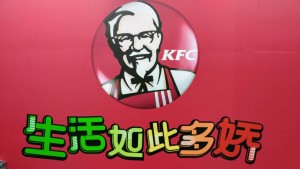MULTINATIONALS: China Patriots Back at Work in Apple, KFC Protests
Bottom line: Recent calls for boycotts of KFC, iPhones and McDonald’s by Chinese patriots are unlikely to result in long-term damage for any of the companies, but could become a problem if any of China’s ongoing territorial disputes escalate.

It seems China’s restless patriots are back at work following a 4 year break, venting their latest anger at the US by smashing Apple (Nasdaq: AAPL) iPhones and calling for boycotts of KFC. This particular bout of Chinese patriotism follows a ruling 2 weeks ago by an international court that found in favor of the Philippines in a territorial dispute with China. The last major bout of similar patriotism came back in 2012, and involved another territorial dispute between China and Japan. But in that instance, Beijing gave much freer rein to many of the patriots, which resulted in long-term Chinese sales declines for the big Japanese automakers.
All that said, owners of stock in Apple and KFC parent Yum Brands (NYSE: YUM) may be losing some sleep these days over the latest calls for boycotts of both brands in China. But Beijing’s reaction looks sharply different compared to the Japan dispute of 2012, with major Chinese media this time calling for restraint and largely dismissing the calls for boycotts as unreasonable.
The boycott talk would actually be quite amusing if it wasn’t so serious, especially due to the potential for violence that resulted from some of the earlier patriotic movements. I was living in Shanghai during one of those movements back in 2005, and was quite surprised as police stood by and did nothing while mobs of angry Chinese burned Japanese cars and pelted the consulate with eggs, paint and other objects.
All of these movements have started in mostly the same way, usually with calls of anger at a particular target over perceived slights against China. This time the anger comes after an international court in the Hague ruled that China has no historical rights to parts of the South China Sea that it claims as its territory near the Philippines. China says most of the South China Sea is its territory, and refused to take part in the international case brought by the Philippines.
Beijing has denounced the ruling repeatedly and says it doesn’t recognize it, and it’s no surprise that its angry reaction has whipped up the enthusiasm of local patriots. Many of those patriots blame the US for the secretly conspiring to undermine China’s claims and supporting the Philippines, even though the US has said it would like to see the conflict resolved peacefully through negotiations.
In their fervor to look for relevant targets to vent their anger, those patriots focused on 2 of the highest profile targets, namely KFC and Apple. Both companies count China as their largest single market outside the US, and earn a huge amount of profits there. So the pair quickly became easy targets for protests.
Fueled on Social Media
I personally didn’t witness any protests, but media reports say angry crowds gathered outside several KFC restaurants in 11 Chinese cities. Word of such protests is easily spread on China’s vibrant social media, and one photo on Weibo, the Chinese equivalent of Twitter, reportedly showed a sign calling on both KFC and crosstown rival McDonald’s to get out of China. (English article)
Meantime, a concurrent movement had other patriots calling on Chinese to smash their iPhones, an act that carries not only symbolic but big monetary overtones due to the smartphones’ high prices. Again, one or more photos of smashed iPhones were apparently making the rounds on Weibo. One woman said she smashed her phone and posted a photo, but later admitted she lied and simply re-posted someone else’s photo. (English article)
In this case Beijing is taking a far different approach than with the earlier anti-Japanese movements, and is calling for restraint. In editorials in major state media, it is using terms like “irrational” and “disruptive” to describe the calls for such boycotts. China was actually on the receiving end of such behavior in 2014, when Vietnam did little to stop patriotic riots that broke out against Chinese businesses over a similar territorial dispute involving the South China Sea.
China’s latest call for restraint probably reflects a realization that its many territorial disputes with countries like the Philippines, Japan and Vietnam could ultimately cause it big headaches if it’s not careful. At the same time, Beijing is acutely aware that it needs foreign companies to help support its slowing economy, and that a pullback in foreign investment due to fears of patriotic boycotts would be counterproductive. Accordingly, US companies probably don’t need to worry too much right now about the latest court ruling, though there’s always the chance of new calls for boycotts if any of the conflicts escalates.
Related posts:
- SMARTPHONES: Apple Loses, But Really Wins in China Court Ruling
- RETAIL: KFC Gets New China Head, Investors Eye Spin-Off
- SMARTPHONES: Apple’s New India Love Affair Leaves China Sweating
- Today’s top stories
(NOT FOR REPUBLICATION)
